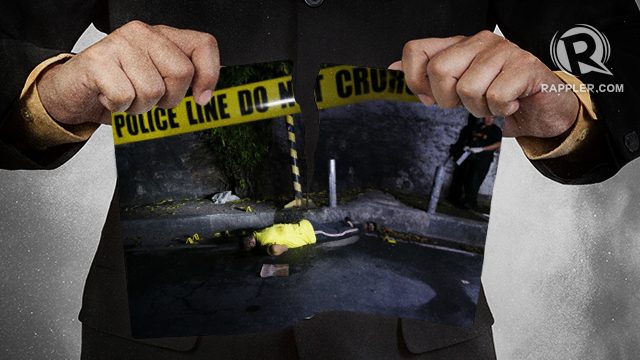SUMMARY
This is AI generated summarization, which may have errors. For context, always refer to the full article.

MANILA, Philippines – President Rodrigo Duterte suspended the police’s Oplan Double Barrel for the 2nd time, leaving his war on drugs for the Philippine Drug Enforcement Agency (PDEA) to do alone.
But for 14 months (it was suspended for a month from January 30 to February 27, 2017), the Philippine National Police (PNP) was all out in fulfilling Duterte’s flagship policy.
So far they have killed 3,906 drug suspects in their operations. Another 2,290 have been killed for drug-related motives, mostly slain by unidentified assailants.
The PNP may be hands off now but the Free Legal Assistance Group (FLAG) did not back down in questioning before the Supreme Court (SC) 14 months worth of operations which killed thousands.
They say that the PNP’s war on drugs was illegal. Here’s why:
1. It didn’t have a legal written order from the President
PNP Chief General Ronald dela Rosa signed on July 1, 2016 Command Memorandum Circular (CMC) No. 16-2016, which operationalized the war on drugs.
According to FLAG’s petition filed before the SC on October 11, the circular “did not cite any written instructions, executive order, administrative order, memorandum circular, memorandum order, or proclamation from President Duterte.”
Deal Rosa’s circular, FLAG said, was based solely on the President’s words. FLAG cited Dela Rosa himself when the police chief testified before a Senate hearing on August 24.
“Your Honor, personally I have no orders to launch the operations but our operating units were taking the cue from the words of the President that our anti-drug operation is unrelenting.”
FLAG said: “CMC 16-2016, in other words, is not based on any presidential directive but rather is based on a mere verbal pronouncement or campaign promise made by Duterte before he assumed the presidency – which obviously has no legal force and effect.”
The group cited Executive Order No. 292 that requires the President to put into writing any order. It’s what he did when he issued the memorandum on October 10 assigning PDEA to be the sole agency to implement his war on drugs.
2. The PNP’s circular empowered police to kill
FLAG noted that the circular was peppered with the words “neutralize” or “negate” which they say are terms which do not have counterparts in law.
“It is not defined in the PNP Manual of Operations or in any official PNP document. But in official PNP reports and police parlance – as admitted by Dela Rosa – “neutralize” means to kill,” the petition said. (READ: A gruesome tale of TokHang: ‘Sir, may humihinga pa’)
With the terms negation or neutralization, FLAG draws attention to page 5 of the 18-page circular:
“Any person suspected to be involved in illegal drug trafficking who dies or refuses the house to house visitation shall be referred to the anti-illegal drug units for immediate case build-up and negation.”
FLAG said it is “clear and unmistakable” that the war on drugs was never meant to reform drug suspects.
“Project TokHang, therefore, is unconstitutional because its real purpose is not just to persuade drug offenders to stop their drug activities, but rather to kill them,” they said in their petition.
3. Anonymous reporting
FLAG also wants to strike out the Department of Interior and Local Government or the DILG’s Memorandum Circular (MC) No. 2017-112. The circular operationalized the Mamamayang Ayaw sa Anomalya, Mamamayang Ayaw sa Iligal na Droga or MASA MASID.
Under this program, cities, municipalities and barangays are required to establish a system of reporting suspected drug personalities. The most controversial channel so far is through drop boxes.
According to FLAG, the longstanding practice of encouraging citizens to report crimes is very different to ask them to submit names of suspected criminals.
“The reporting of crimes is done by witnesses who have knowledge of criminal activity. The reporting of alleged criminals can be done by anyone who suspects, rightly or wrongly, that another person is criminal,” FLAG said.
FLAG stressed that instead of the police function to gather evidence, they are instead allow to just compile the names “without any safeguards for protecting innocent persons.”
Appeals
Aside from asking the SC to declare the two circulars illegal, FLAG also appealed to the High Court to compel authorities to investigate cases of death.
The most used narrative of the police thus far is that of “nanlaban” or suspects fighting back who have to be neutralized lest they put the cop’s life in danger.
In an interview with Al Jazeera on October 7, Foreign Secretary Alan Peter Cayetano claimed that “every single one” of the deaths are being investigated.
But as of September 27, the PNP has only managed to submit 10 inquest reports out of the 3,800 deaths at the time.
The Department of Justice (DOJ) has prosecuted only 71 drug-related deaths, and of those, only 19 has reached the courts, as per DOJ’s own data as of August 22.
(READ: Sereno: Special committee evaluating rules to address extrajudicial killings)
FLAG appealed to the SC to:
- Compel police officers in “nanlaban” cases to submit their firearms to the NBI for forensic examination and safekeeping
- Require the PNP Internal Affairs Service (IAS) and/or the National Police Commission (NAPOLCOM) to submit a monthly report to the Court full documentation of police operations which result to death
FLAG requested to hold oral arguments to present their arguments before the public.
“Unless this Honorable Court intervenes, the killings will continue and the rule of law itself will be supplanted by justice from the barrel of a gun,” they told the SC. – Rappler.com
Add a comment
How does this make you feel?
There are no comments yet. Add your comment to start the conversation.